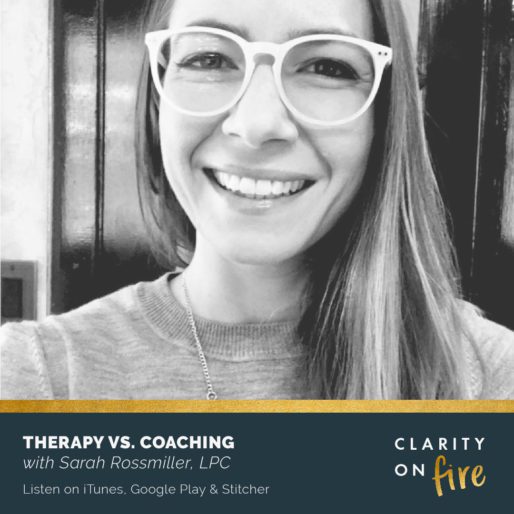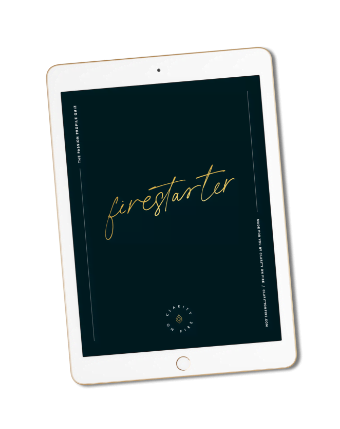Click the play button below, or subscribe and listen through our podcast on iTunes, Stitcher, or Google Play.
Podcast: Play in new window | Download
Have I ever told you guys about the time I fired my therapist? Well, to cut to the chase — she was god-awful. I left every session with her feeling worse about myself than when I’d walked in. Personal development is hard work, but it probably shouldn’t make you cry for hours after the session is over.
Honestly, that experience was part of what cemented my desire to become a coach. I knew I wanted to help people move forward with their lives, rather than continually delve into the past (which is what I perceived therapists as doing, for the most part).
But that experience didn’t turn me off of therapy entirely. In any profession (coaching absolutely included) you’re bound to find incredibly talented people and god-awful people.
Kristen and I have been dying to talk to a therapist of the “incredibly talented” variety for a long time — we’ve been compiling questions for years! And thankfully, one of my clients recently introduced me to her therapist, Sarah Rossmiller, who came on the podcast to talk to us about:
- Why some people (like me) have a terrible time in therapy, and why others thrive. And what makes the difference between “good” and “bad” therapy.
- The differences between therapy and coaching, and when it might be right to pursue one over the other.
- Why SO many people are struggling with mental health issues, and how to tell if that’s normal (or if you might have a more serious problem).
- How we can accept the emotional ups and downs of life without spiraling out of control.
- Why so many women (1 in 4 in the U.S.!) are on psychiatric drugs, and Sarah’s perspective about when we might need to be medicated and when we probably don’t.
- Why people who are willing to rebel against norms tend to be the happiest and most fulfilled.
After you’ve listened, leave a comment below to let us know how our frank conversation with Sarah resonated with you!
MORE ABOUT SARAH ROSSMILLER, LPC
Sarah is a Licensed Professional Counselor and Trained Yoga Instructor offering individual and group therapy in “the heart of Houston,” also known as the charmingly eclectic neighborhood of Montrose. She is devoted to helping others create and manage their own personal journey of becoming and shed any residual trauma blocks holding them back. Her rebellious spirit is central to her work as she encourages rebellion from false core-beliefs, harmful cultural conditioning, and shame-based untruths that prevent us from becoming who we are meant to be.
You can find her online at Rebellious Wellness Therapy.
WANT $50 OFF THE PASSION PROFILE SHORT COURSE?
Heads up! From December 10-14 we’re going to be offering a special holiday deal ($50 off!) on the Passion Profile Short Course — our 5-ish hour, totally online, go-at-your-own-pace program that helps you find your career direction in as little as 1 day.
We’re also going to be offering a free, live Q&A workshop session to anyone who buys the PPSC during that window, as well as anyone who’s worked with us in the past.
You don’t need to do anything yet! We’ll remind you when the time comes. But mark your calendars if you don’t want to miss out.
IF YOU LIKED THIS, YOU’LL ALSO LOVE…
Side Chat: How to work like a woman (in a world that doesn’t want you to)
Emotional constipation with Joanna Platt
You can’t cure the human experience with Kyle R.



I was looking for your ratings & reviews button but I’ll add a comment, I’m not sure if that is the same thing.
I listen to your podcasts on my commute to & from work and I have never given you a review, but today’s podcast compelled me to! You ladies are phenomenal! You have helped me so much over the past two years while recovering from my self-diagnosed “situational depression”, I can’t thank you enough! However todays podcast really hit home for me as I struggle to help one of my (INFJ) teenage daughters through a rocky patch… thank you Universe!!!
Thank you so much for this comment, Jacqui! The ratings and reviews button we mention is in whatever podcast app you listen in. So if you’re in Apple Podcasts, for example, you can usually click on our show and scroll down and see a place to leave a rating and review. 🙂
We’re so glad that this episode helped you learn how to approach your daughter’s rocky patch!
Hi there, this is quite timely.. ive been receiving therapy for 6 months and I feel like ive reached an impasse- Ive revisited by past trauma, identified how its shaped my patterns, but now I need tools and guidance on how to get over these patterns. My therapist cant help me with this it seems. So im pretty frustrated and feel like Im getting nowhere. People say ‘its part of the process’ – is that just bullshit? I come out of therapy feeling depressed, and much worse than when I went in. That happens every time. Today my therapist said ‘You had a pretty tough childhood’ and I replied ‘well;l I didnt realise that until I started therapy..I actually was pretty happy with my childhood’ – does therapy invent issues?? im really starting to doubt the efficacy of it and wonder if it could actually be harmful.
Hey Maria,
I’m so sorry you’re feeling this way! Obviously I can’t speak with authority on this issue, but I will definitely share your comment with Sarah. I will say, though, that if you’ve been doing any kind of personal development work for 6 months and don’t feel like you’re getting anywhere, and that it’s actually making you feel worse, and that you feel issues are being invented that you didn’t have much energy around, that is NOT something you have to tolerate. The goal of this kind of work is to make us feel better; more whole and fulfilled versions of ourselves. That work is not always easy, particularly at the beginning, but after 6 months I think it’s reasonable to want to have made some measurable progress.
This is a REPLY TO MARIA…. I couldn’t get the reply button to work for me.
I definitely agree with Rachel that after 6 months in regular/consistent therapy (at least averaging 1x/week) you should have some sense of relief. Even when the work continues to be difficult or painful, you need to feel you are making progress and have some sort of vision in place for how you are to move forward and gain further relief and healing. It’s true that the struggle is part of the process, but there needs to be some relief too! Leaving therapy feeling worse every time is not ok.
I used to use this disgusting metaphor with client to help them establish expectations around therapy, and maybe it is useful to bring up here (if you’re easily grossed out, skip this part!) Sometimes therapy is like an infected boil. It’s like a giant painful pimple – It’s filled with pus and blood, it hurts, and it won’t heal until you lance it open and squeeze all the gunk out. You have to squish out the pus – it’s ugly, bloody, and smells bad. It hurts, maybe worse than if you’d just left it alone. But of course, if you’d left it alone eventually the infection would have spread and caused more pain and damage, so that wasn’t an option. Even though it’s messy and painful, once you squeeze the pus out and rinse it clean, it can finally breath and heal. It’s a relief – the pressure is gone, and the pain begins to subside. In therapy, in order to heal one is often met with the task of exploring some pretty uncomfortable and possibly painful feelings and experiences. The idea is that once you share these things, you free yourself up for clearer thinking and change. You may no longer feel so much tension and pressure b/c the repressed emotions were released, and you were not rejected in the process. You understand and accept yourself more deeply. You may feel heard and validated and able to seek closure and move forward. You find you’re more open to try new, more effective ways of approaching your life and relationships.
It is not uncommon to realize in therapy that your childhood had a negative impact on you. Many times people grow up never questioning their childhood experiences because as kids we have little to no means of comparison. We take for granted that we are having a “normal” experience when in fact it may be impeding our development as a balanced and aligned human being in many different ways. We may have little clarity around the source of our suffering because as children we learned minimization, repression, and avoidance as methods of coping through our childhood and carried them with us as adults.
How long it takes to move out of the anger and grieving period once awareness about past trauma has been established depends on the person, but it is not good therapy to encourage dwelling or blaming, in my opinion. I believe in supporting an individual’s personal responsibility as method of increasing empowerment. It is also good practice to provide clients with coping mechanisms BEFORE sorting through the past sometimes in order to help them manage what this process brings up.
I wonder if you have spoken to your therapist about how you’re feeling about therapy and what you want to gain from it or want to change. Maybe having a frank conversation with him/her could help move the two of you into the next phase of your therapy. I suggest you attempt this before giving up on them, unless of course you feel unsafe approaching your therapist in this way. I didn’t get the impression the therapist is an unsafe person from what you shared, though they may not be the right fit for you! If you bring these feelings up and they respond defensively or dismissively, you know you need to find a new resource.
Therapy should not be so depressing. In fact, it is reasonable to expect therapy to focus on your successes, progress, gratitude, and strengths. Laughing together with your therapist is reasonable to expect. Setting goals and asking for tangible tools to help with healing and recovery is reasonable.
Maria, I hope you are able to get some relief soon!